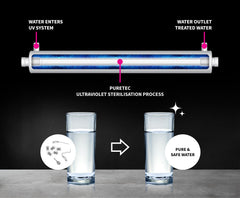Water is essential for our survival, but it can also contain harmful contaminants such as bacteria, viruses, and other pollutants. Ultraviolet (UV) water filtration is an effective and popular method of purifying water for drinking, cooking, and other purposes. In this blog, we will explore the technology behind UV water filtration, its benefits and limitations, and how it compares to other water purification methods.
How does UV water filtration work?
UV water filtration uses ultraviolet light to kill or inactivate microorganisms such as bacteria, and viruses, that can cause waterborne illnesses. The UV light disrupts their DNA, rendering them unable to reproduce and infect humans. UV water filtration systems consist of a UV lamp, a quartz sleeve that protects the lamp, and a reaction chamber where water flows around the lamp.
When water passes through the reaction chamber, the microorganisms in the water are exposed to the UV light and are either killed or inactivated. The water then flows out of the system, ready for use. UV water filtration systems are effective against most types of microorganisms, including chlorine-resistant bacteria such as Cryptosporidium and Giardia.
Benefits of UV water filtration
- Chemical-free: UV water filtration does not use any chemicals such as chlorine, which can leave an unpleasant taste and odor in the water.
- Effective: UV water filtration is highly effective at killing or inactivating microorganisms in water, including those that are resistant to chlorine.
- Low maintenance: UV water filtration systems require minimal maintenance, with only periodic replacement of the UV lamp and cleaning of the quartz sleeve.
- Easy to install: UV water filtration systems are easy to install and can be used in a variety of settings, from homes to large-scale water treatment plants.
Limitations of UV water filtration
- No removal of chemicals or particles: UV water filtration is effective at killing microorganisms, but it does not remove particles or chemicals from the water. For this reason, it is often used in combination with other water treatment methods such as sediment filtration and activated carbon filtration.
- Dependent on water quality: UV water filtration is dependent on the quality of the water being treated. If the water contains high levels of sediment or organic matter, the effectiveness of the UV lamp may be reduced.
- Energy consumption: UV water filtration systems require a source of electricity to operate the UV lamp, which can increase energy consumption.
How does UV water filtration compare to other water purification methods?
UV water filtration has several advantages over other water purification methods. For example, it is more effective than chlorine at killing some types of microorganisms, and it does not leave any chemical residue in the water. However, it is not as effective at removing particles or chemicals from the water as other methods such as reverse osmosis or distillation.
In conclusion, UV water filtration is an effective and chemical-free method of purifying water for drinking and other purposes. It has several benefits over other water purification methods, including low maintenance and easy installation. However, it is important to note that UV water filtration is not a standalone solution and should be used in combination with other water treatment methods for optimal results.
Check out our range here.




